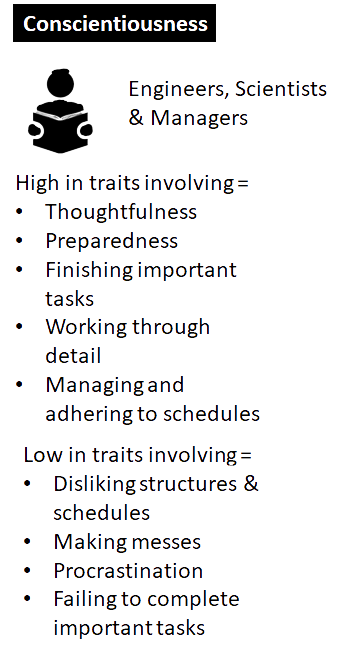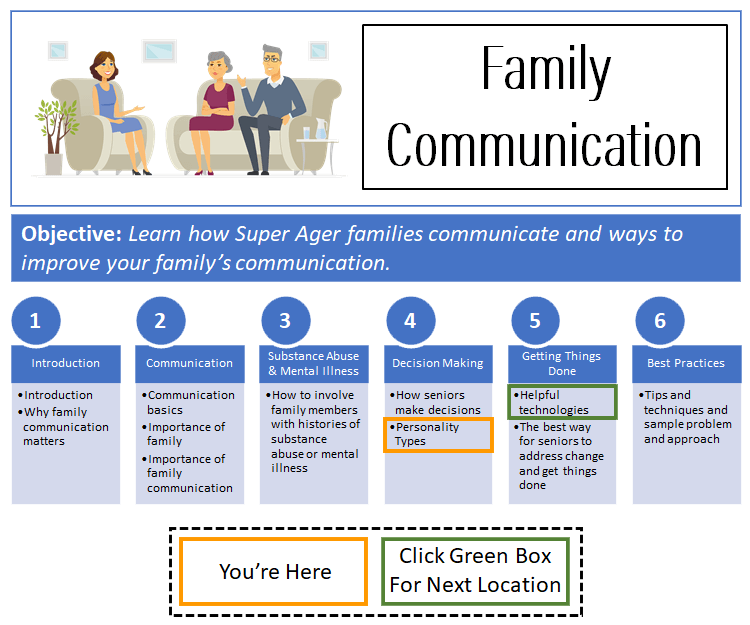Personality Types
Click here to see what's on this page.
People who understand personality types are better at getting what they want. Carmen and I are playing pop psychology here for sure, but there’s a reason for our play. In other words, we want to help you solve family challenges, and knowing a little bit about how to interact with some common personality types can help you foster better family cooperation.

Can you learn something from this Chapter? Consider the experience of going to the Airport.
Personality Example
Let’s learn a little about Earl and Wendy.
Earl
Earl is a planner. He checks the weather, always has a full tank of gas in his car and likes to map out his routes. Also, he likes to arrive early. He wants plenty of time to deal with any situation. He likes smooth, event-free trips. Earl hates the unexpected because it messes up his plans.
Wendy
Likes to leave at the last minute. She really doesn’t think about what might go wrong. In other words, she trusts that she’ll make it to her destination, if not on time, then when she gets there. She hates plans and likes being spontaneous. Also, she prides herself on coping with out of the blue situations. She likes winging it.
These people are very different. They are different personality types. One clearly likes to plan, stay on schedule and minimize avoidable problems. The other is much more open to “winging it” and willing to address challenges as they arise, even those caused by their own actions.
Ride To Airport Scenario
Your best friend has purchased you an airplane ticket to meet with your childhood hero who happens to be visiting your friend’s office. The plane leaves next week on Monday morning, and the event takes place that afternoon. Who do you want to bring you to the airport?
If you don;t want to miss this once in a lifetime opportunity, yoou’re going to pick Earl. Why? His character traits. They include:
Doing Things With Mom Scenarios
Taking Mom To A Doctor’s Appointment
Mom has finally gotten an appointment with a cancer specialist that has a three-month waiting list. Mom’s two local oncologists have differed on how to treat Mom’s cancer. This specialist is one of the best in the country. You’re out of town on appointment day and need to select someone to ensure that Mom makes the appointment. Do you pick Earl or Wendy?
Taking Mom To A Concert
Mom always loved going to evening concerts in the park. She hasn’t been in two years. She’s been dealing with a terminal illness, problems with incontinence and early-stage Alzheimer’s. The concert that she loves takes place in a week, but you’re attending your spouse’s father’s funeral in another State. Do you ask Earl or Wendy to bring Mom to the concert?
The Mom scenarios above are simplified. However, they took place. In both cases, the results were a fiasco because the person selecting the chaperone for Mom picked the wrong personality type. At the time and they never thought about the personality of the person they asked to do the activity. They called trusted friends. Not the reasons why they were trusted or how their personality might impact their ability to complete the task. The first person that said yes, got the job.
A Wendy was selected to take Mom to the Doctor’s appointment. The Doctor’s appointment was missed. Wendy took Mom out for breakfast, lost track of time, and was an hour late to the appointment.
An Earl was selected to take Mom to the concert. Earl picked Mom up an hour early. They arrived an hour early to the concert. Mom had incontinence issues, became distracted, and said she wanted to go home. This freaked Earl out. He took her home.
Carmen and I think it’s critical to learn a little about personality types so you can eliminate or at least lower the probability of making the mistakes above.
What Is Personality?
Personality can be defined as a set of characteristics that include behaviors, cognitions, and emotional patterns that make up a person. Scientists like to conduct experiments by creating hypothesis’s and then testing the hypotheses by observing and measuring things. Social scientists have identified five core personality traits. These scientists, and practicing psychologists, have found that these traits can be measured and then used to predict behaviors. They’ve become known as the “Big Five.”
The Big Five Personality Traits
The Big Five are (1) openness, (2) extraversion, (3) conscientiousness, (4) neuroticism (or emotional stability), and (5) agreeableness. In each category, lists of adjectives can be used to give greater definition to the Big Five. Conscientiousness, for example, is identified and measurable with adjectives such as self-discipline, dutifulness and competence. Social scientists turn these lists of adjectives into questionnaires and give people personality tests. These tests can be used to make behavioral predictions.
Carmen and I are not suggesting you give family members personality tests. But we do want to familiarize you with some basic personality traits so you can improve communication and cooperation with family members.
Openness
The Openness Trait determines a person’s creativeness, insightfulness, imagination and willingness to experience new things. These are people that seek new adventures, prefer variety and diversity and are curious about how they perceive and interact with their surroundings.

Extraversion
The Extraversion personality type determines a person’s sociability, friendliness and energy. These are people that are generally energetic, get energized around people, like to start conversations with new people and naturally friendly and optimistic.

Conscientiousness
The Conscientiousness Trait determines a person’s stability, commitment to goals, and thoughtfulness. These are people that are neat and organized, finish assignments, and are detail-oriented.

Agreeableness
This personality type determines a person’s ability to go with the flow and get along with others. These are people that exhibit patience and kindness, that enjoy helping others and making people happier.

Neuroticism
The Neuroticism Trait determines a person’s stability and self-confidence. These are people that tend to get upset, lack confidence, and struggle with negative thinking.

Variations On The Big 5 Personality Types
The Big Five have many variants. You may have heard of Myers-Briggs or even taken a Myers-Briggs Type Indicator personal inventory test. This is a variant of the Big 5 and focuses on similar areas. Their inventory identifies areas like (1) your preferred world, (2) how you like processing information, (3) how you like making decisions, and (4) your preferred world structure. The goal is to make psychological types useful in people’s lives.
Myers-Briggs categorizes personality types into extroversion (E) and introversion (I). Information processing is divided into sensing (S) and intuition (N). Decisions into logic or thinking (T) and consistency versus considering each situation and the people involved or feelings (F). World structure into getting things decided or judging (J) versus staying open to new options and circumstances or perceiving (P). Myers-Briggs takes introversion (I), extroversion (E), sensing (S), intuition (N), thinking (T), feeling (F), judging (J), and perceiving (P), or I,E,S,N,T,F,J,P and combines them into 16 personality types.
No Need To Be An Expert In Personality Types
Carmen and I don’t want you to become personality experts; we just want you to think about how personalities might impact (1) how people perform tasks, and (2) how they respond to being asked to perform tasks. In out tips and techniques Chapter we’ll give you some simple tools that you might find useful.
Don’t forget that any of us that live long enough will need the assistance of other people — most likely family. Carmen and I have learned from Super Agers that the more you understand about the personalities of the people around you like your children, the better you’ll communicate.
In the Best Practice Chapter of this Section, we’ll suggest some simple ways to use a simple understanding of personalities to help you communicate with family members.
Other Resources On Personality Types
A good article on personality types can be found here.
Make sure to see our other sections, especially, Getting Things Done here, and Best Practices: Tips and Techniques, here.
